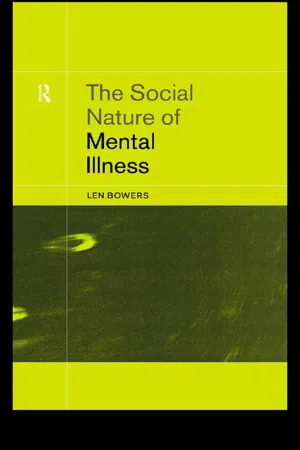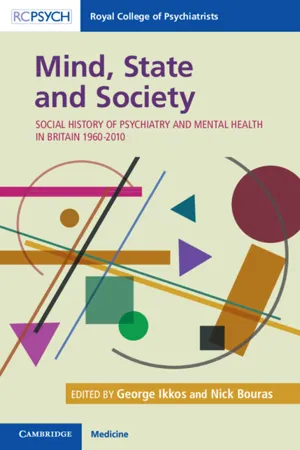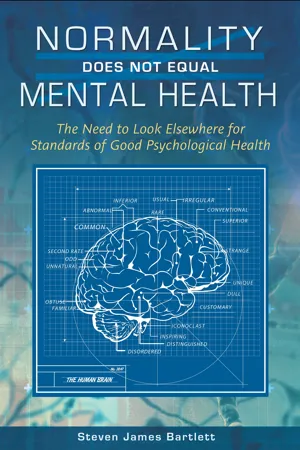Psychology
History of Mental Health
The history of mental health encompasses the evolution of societal attitudes, beliefs, and treatments related to mental illness. It has evolved from ancient beliefs of supernatural causes to modern understandings rooted in scientific research and evidence-based practices. Throughout history, various cultures and time periods have shaped the understanding and treatment of mental health conditions.
Written by Perlego with AI-assistance
Related key terms
1 of 5
9 Key excerpts on "History of Mental Health"
- eBook - PDF
International Perspectives on Mental Health
Critical issues across the lifespan
- Barbara Fawcett, Zita Weber, Sheila Wilson(Authors)
- 2011(Publication Date)
- Bloomsbury Academic(Publisher)
PART I Mental Health: An Overview CHAPTER 1 Historical Moments in Mental Health: From Straitjackets to the Streets History, according to Liam Clarke (2004), is not the past, but rather versions of the past. When we apply this premise to the history of madness, psychiatry, power and knowledge, it is clear that there is not just one version of the past, but many. Historical moments, just like contemporary situations, are clearly embed-ded within socio-cultural contexts and the importance of context cannot be overstated. It cannot be assumed, for example, that given the social, political, cultural and infrastructural differences between countries, similar responses to interventions will follow (Beukens et al., 2004). Bracken and Thomas (2001), two leading psychiatrists, reinforce this point when they state that ‘Contexts, that is to say social, political and cultural realities, should be central to our understanding of madness’ (2001: 727). Given the importance of contextual sensitivity, any analy-sis of historical narratives across the world will clearly offer points of convergence as well as points of divergence and dif-ference in theories, policies and practices. Deinstitutionalization, which has become an almost international phenomenon, for instance, has been interpreted locally in different countries and case management, a ubiquitous term that has accompanied deinstitutionalization, is practised within a local context. Even a cursory glance at the historical moments in relation to mental distress, mental health and mental illness reveals instances 11 12 M ENTAL H EALTH : A N O VERVIEW of beliefs moving beyond the available evidence, some theories becoming more and more questionable, whilst certainties occlude the complexities of the context (Hatfield and Lefley, 1993; Fawcett and Karban, 2005). As Clare (1983) concludes, specu-lation in understanding the nature of mental ill-health or illness often masquerades as scientific truth. - eBook - ePub
- Dr. Leonard Bowers(Author)
- 2003(Publication Date)
- Routledge(Publisher)
et al. (1985) support the position that ‘the recognition and interpretation of mental illness, indeed its whole meaning, are culture-bound, and change profoundly from epoch to epoch’. This picture of mental disorder as a culturally-relative phenomenon with no real historical universality is of course precisely the same picture which is in the frame in transcultural psychiatric studies. The issues and arguments that arise therefore parallel the debates in cross-cultural studies. However, despite their assertions of the historical relativity of mental disorder, few historians have attempted to tackle the topic seriously. Transcultural scholars can, after all, visit different cultures, ask questions and observe their people. Historical scholars have to rely almost solely on written historical sources, as well as their own powers of interpretation and analysis. Direct comparisons of mental disorder now and at some point in the past are therefore fraught with difficulty, although not completely impossible. The early history of psychiatry was mainly preoccupied with formal government policy. In the later period historians have concentrated upon the professional organisation of psychiatry and its development. The nature of mental disorder as a phenomenon has largely been left as a side issue, although not an unimportant one. Some examinations of the topic have been made, and it is to these that we now turn.TEMPORAL DEVELOPMENT OF PSYCHIATRIC DIAGNOSES
Some authors, mainly academic psychiatrists, have attempted to get to grips with the diagnostic systems of psychiatry from the point of view of their historical development. For example, Pichot (1994) has described the temporal development of psychiatric diagnoses, dating the birth of the modern diagnostic system to one hundred years ago with the work of Kraepelin. It would, however, be fairly accurate to say that Pichot assumes the historical continuity and universality of the phenomenon of mental disorder. For him, the question does not seem to arise as to whether mental disorder has itself changed in form or nature. Instead he is concerned with the changing conceptions, interpretations and classifications of mental disorder. He wishes to illuminate the origins of our current diagnostic systems and persuade us that it may be possible to improve upon current conceptions and classifications. He fears that development of the ICD and DSM could lead to an over-rigidity in our thinking which might blind us to advances in the classification of mental disorders. - eBook - PDF
Mind, State and Society
Social History of Psychiatry and Mental Health in Britain 1960–2010
- George Ikkos, Nick Bouras(Authors)
- 2021(Publication Date)
- RCPsych Publications(Publisher)
History of Psychiatry (2011) 22: 201–14. 37. M. V. Seeman, Forty-five years of schizophrenia: Personal reflections. History of Psychiatry (2006) 17: 363–73. 38. A. Donald, The Wal-Marting of American psychiatry: An ethnography of psychiatric practice in the late-twentieth century. Culture, Medicine, and Psychiatry (December 2001) 25: 467–72. 39. P. Fennell, Treatment without Consent: Law, Psychiatry, and the Treatment of Mentally Disordered People Since 1845. London: Routledge, 1996, p. 156. 40. Quoted in ibid., p. 158. 41. M. S. Micale, The ten most important changes in psychiatry since World War II. History of Psychiatry (2014): 25: 485–91; D. Healy, The Creation of Psychopharmacology. Cambridge, MA: Harvard University Press, 2002. 42. H. A. Nasrallah, Transformative advances unfolding in psychiatry. Current Psychiatry (2019) 18: 10–12. 43. P. Prior and G. McClelland, Through the lens of the hospital magazine: Downshire and Holywell psychiatric hospitals in the 1960s and 1970s. History of Psychiatry (2013) 24: 399–414. 12 Social and Institutional Contexts Chapter 2 The International Context Edward Shorter Introduction There is a distinctive British tradition of psychiatry that goes back to the earliest days embodied in such institutions as the York Retreat. What is the definition of ‘insanity’?, asked James Sims in 1799. It is, he said, ‘the thinking, and therefore speaking and acting differently from the bulk of mankind, where that difference does not arise from superior knowledge, ignorance, or prejudice’. 1 It is a definition that has never been surpassed. The late 1950s and early 1960s were a period of dynamic change in British psychiatry. The Mental Health Act in 1959 saw a vast expansion of outpatient care and made it possible for clinicians to admit patients without the intervention of the magistrate. - eBook - PDF
A Handbook for the Study of Mental Health
Social Contexts, Theories, and Systems
- Teresa L. Scheid, Eric R. Wright(Authors)
- 2017(Publication Date)
- Cambridge University Press(Publisher)
As this overview should indicate, there is much more research that needs to be done to extend our understanding of mental health and illness before we will be able to resolve the ongoing debates on the existence and causes of mental illnesses, much less on suitable treatments. We do know that social conditions and environments are critical not only in understanding what constitutes a mental health problem, but in the course and outcome of mental health problems as well. However, the mecha-nisms through which the social environment influences mental health have not been thoroughly studied (Morgan, McKenzie, & Fearon, 2008 ). Part II will direct more focused attention to the social context of mental health and illness. 6 Sociological approaches regard mental health and illness as aspects of social circumstances. One type of sociological study examines the sorts of social conditions that influence levels of mental health and illness such as negative life events, ongoing stressful circumstances, demanding social roles, levels of social support, and the strength of cultural systems of meaning. Another type of study focuses on how social and cultural influences shape the definitions of and responses to mental health prob-lems. These kinds of studies show how key recent trends including the medicalization of a growing number of conditions, the increased use of prescription drugs to deal with mental health problems, and a greater willingness to identify emotional suffering as mental illnesses that require professional help, are transforming how modern societies deal with psychological problems. The sociological study of mental health and illness is both distinct from and complementary to more individ-ualistic psychological and biological approaches to these topics. - eBook - PDF
Mental Health User Narratives
New Perspectives on Illness and Recovery
- Bruce M.Z. Cohen(Author)
- 2008(Publication Date)
- Palgrave Macmillan(Publisher)
Despite conflicting views on the definition and nature of mental illness within the profession – leading to a variety of treatment options – medical intervention continues unabated, encouraged by the pharmaceutical 6 Mental Illness and Psychiatry 7 industry. The result is a continued devaluing and disempowerment of user meanings for illness. 1.2 Histories of madness 1.2.1 The official account The ‘official account’ of psychiatry’s history, as often profiled in medical text books, is one of slow but steady progress from the unenlightened days of the mistreatment of lunatics in places like Bedlam to the present state of medical expertise (Johnstone 1989). Three key phases are cited in the official account of this progression. Firstly, the shift in the 19th century from primitive views of madness as caused by supernatural agencies to a more sophisticated medical view, with the era of ‘moral treatment’ ending the worse excesses. Secondly, the development of some local outpatients and aftercare facilities in the 1930s, as well as the discovery of new treatments such as insulin coma therapy and electroconvulsive therapy (ECT). Thirdly, the ‘drug revolution’ of the 1950s which enabled discharge and the possibility of users living outside of the psychiatric hospital. Thus, psychiatry becomes accepted as part of the medical establishment and patients avoid the stigma of the old asylums by attending psychiatric units at general hospitals ( Johnstone 1989: 172–3). The history of madness and psychiatry that I will outline chal- lenges this official account, highlighting social, economic and political processes in the identification and treatment of those considered ‘mad’. As Miller (1986: 13) has stated, ‘the history of psychiatry is a history of fundamental transformations of its institutional, theoretical, profes- sional and judicial existence. - Ingrid Zechmeister(Author)
- 2018(Publication Date)
- Peter Lang International Academic Publishers(Publisher)
In the critics' view, the beginning of the medical treatment of mental illness was neither due to an altruistic motive nor was it the Ingrid Zechmeister - 978-3-631-75434-4 Downloaded from PubFactory at 01/11/2019 04:56:41AM via free access Perspectives of Mental Illness 25 result of available effective treatment methods but it was rather due to the self-interests of medical professionals. What these critical positions have in common is that they draw attention to the issue that what has been defined as mental illness has also to be seen in the light of various forms of social control and norms. Although the theories have somehow fallen out of fashion nowadays, similar topics have also been raised in more recent work. For example, Astbury (2002, 149) remarks that all diagnostic criteria and assessments of mental health depend on the theoretical constructs of human behaviour, on what is believed to constitute the normal, and how this can be clearly distinguished from the pathological. To conclude, this thesis is based on the notion of a factual reality of mental illness. Nevertheless, the critical arguments are particularly valuable to maintain a reflective approach concerning value-judgements and tacit cultural knowledge which may constantly shape this reality. 2.2. Terminology and Definitions The previous chapter has shed some light on the historical developments in psychiatry. In the following paragraphs this information will be applied in order to define terms which will be used in the remainder of the text. Hence, I am going to outline what I mean by 'mental illness' and 'mental health care' and which terms will be used for people who are affected by a mental illness. As I have shown in the previous part, rather than being based on a single concept, markedly different perspectives and frameworks of the nature of mental illness exist.- eBook - PDF
Society on the Edge
Social Science and Public Policy in the Postwar United States
- Philippe Fontaine, Jefferson D. Pooley(Authors)
- 2020(Publication Date)
- Cambridge University Press(Publisher)
322 Mental illness, as the eminent historian of psychiatry Michael MacDonald once aptly remarked, is “the most solitary of afflictions to the people who experience it; but it is the most social of maladies to those who observe its effects.” 1 Serious forms of mental disturbance represent an intractable intellectual puzzle while imposing immense costs – both material and nonmaterial – on both individual sufferers, their immediate social circle, and society at large. One might expect the subject, therefore, to be of great interest to social scientists of all sorts. On its face, economists ought surely to be interested in the financial costs, both direct and indirect, that mental illness imposes, or in estimating the respective efficacy of differing approaches to the treatment and management of mental illness. To the extent that mental illness is accompanied by – indeed defined by – disturbances of mental function, psychology would seem to have a natural interest in exploring abnormal mental states, and perhaps in developing ways of responding to and treating disturbances of emotion, reason, and cognition. As for sociology, a host of topics suggest themselves: the social location of mental illness; the possible role of social factors in the genesis of mental disturbance and in its resolution; the role and impact of the family and the immediate interactional circle of the patient in identifying, responding to, and coping with insanity; and the nature of organized responses to the problems mental illness poses, just to mention a few. Most anthropologists during the first half of the twentieth century focused their attention on non-Western societies, but for the past three-quarters of a century, they too have increasingly turned to the study of developed societies, the United States prominently among them, and here too one might expect to find a distinctive disciplinary lens being trained upon the problem of mental illness. - eBook - PDF
- Gordon L. Flett, Nancy L. Kocovski, Gerald C. Davison, John M. Neale(Authors)
- 2018(Publication Date)
- Wiley(Publisher)
1 LEARNING OBJECTIVES 1. Understand what constitutes abnormal behaviour. 2. Compare the history of psychopathology across centuries. 3. Describe current attitudes toward people with psychological disorders, including how stigma and self-stigma are potential barriers to help-seeking. 4. Describe mental health problems and their treatment in Canada. 5. Describe the issues and challenges in the delivery of psychotherapy. Introduction: Definitional and Historical Considerations, and Canada’s Mental Health System CHAPTER 1 Every day of our lives we try to understand other people. Acquir- ing insight into what we consider normal, expected behaviour is difficult. It is even more difficult to understand human behav- iour that is beyond the normal range. This book deals with abnormality as it applies to psy- chological disorders, including their description, causes, and treatment. As you will see, we know with certainty much less about our field than we would like. As we approach the study of psychopathology—the field concerned with the nature and development of abnormal behaviour, thoughts, and feelings— we do well to keep in mind that the subject offers few hard and fast answers. Another challenge we face in studying abnormal psy- chology is the need to remain objective. Our subject matter is personal and it is powerfully affecting, making objectivity diffi- cult but no less necessary. The disturbing effects of abnormal behaviour intrude on our own lives. Who has not experienced irrational thoughts, fantasies, and feelings? Who has not felt profound sadness that is more extreme than circumstances can explain? Most of you will have known someone whose behaviour was upsetting and impossible to fathom, and realize how frustrating and frightening it is to try to help a person suf- fering psychological difficulties. - eBook - PDF
Normality Does Not Equal Mental Health
The Need to Look Elsewhere for Standards of Good Psychological Health
- Steven James Bartlett(Author)
- 2011(Publication Date)
- Praeger(Publisher)
The greatly expanded range of choice offered by the diversity of theories and methods of psychotherapeutic treatment can be nothing short of overwhelming, espe- cially in the context of widespread disagreement as to how practitioners should go about making intelligent, justifiable decisions given the many alternatives and their possible combinations. 1 On the most elemental level, conceptual confusion in current psychiatric nosology has come about due to the great variety of distinct, overlapping, and sometimes incompatible definitions that have been proposed for such central terms as ‘normality’, ‘mental disorder’, and ‘mental health’. In addition to these sources of theoretical complexity, ambiguity, and resulting turmoil, there is a hidden dimension that has been responsible for a substantial amount of avoidable confusion, a dimension that has been universally neglected throughout the literature. That hidden dimension concerns the psychology of definition in psychiatric nosology. By this I mean the psychological predispositions that lead nosologists as well as many others in the mental health profession to lose control over self-critical, deliberate, intelligent understanding of what they are doing when they define concepts central to psychiatric or psychological diagnosis and treatment. The phrase ‘the psychology of definition’ may suggest several hypotheses: (1) that we mistakenly consider the process of definition to be simple, 32 Normality Does Not Equal Mental Health straightforward, and well-understood; (2) that definition brings into play psychological propensities of which most of us tend not to be aware; and (3) that these psychological propensities, if clearly and self-consciously understood, would help us to control them and thereby gain a significant measure of conceptual clarity and theoretical integration, in the process lessening much of the conceptual turmoil that encumbers current psychia- try and clinical psychology.
Index pages curate the most relevant extracts from our library of academic textbooks. They’ve been created using an in-house natural language model (NLM), each adding context and meaning to key research topics.








